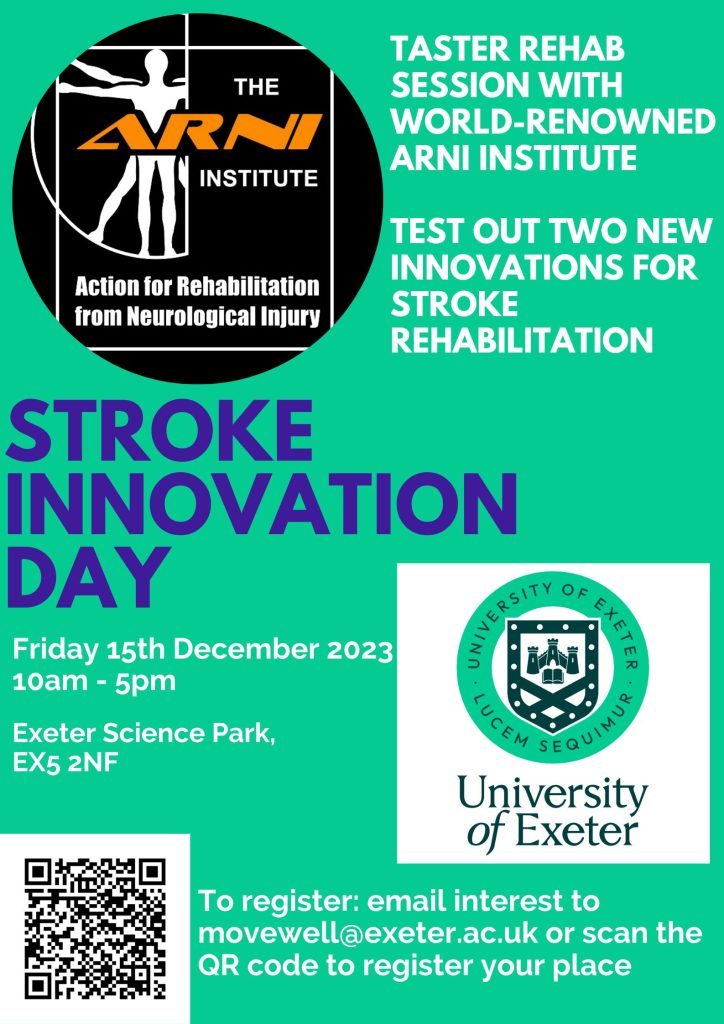 Virtual reality (VR) basically means interactive simulations of activities within environments that appear and feel similar to real-world objects and events (augmented reality).
Virtual reality (VR) basically means interactive simulations of activities within environments that appear and feel similar to real-world objects and events (augmented reality).
Would you like to apply (or forward this email to a colleague/friend to consider applying) to come on 15th December 2023 to the VSimulators at Exeter Science Park:
- to get involved with testing cutting-edge VR?
- to take advantage of follow-on exercise of the University lending you prototype VR kit for use at home for 6 weeks?
- to meet Professor Helen Dawes, Dr Tom Balchin & research colleagues & to take part in various workshops?
If so, please read below!
After stroke, survivors who wish to try such augments can find numerous task-training systems on the market that involve a variety of activity-based games that test and (purport hopefully to improve facets of) strength, speed, endurance, range of motion, coordination, timing and cognition.
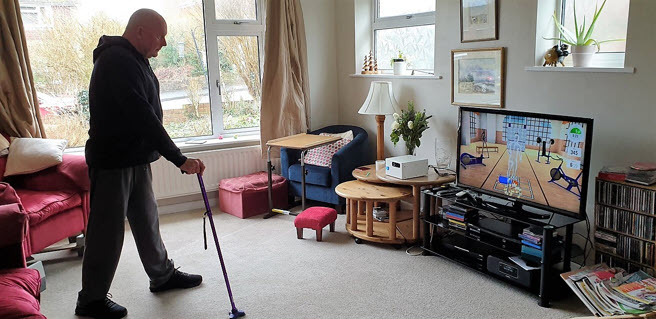 VR interventions can be expensive but most are usually created to be affordable. A set-up often features just a keyboard, a mouse, a specialised multi-modal device such as a console or gloves with built-in movement sensors. Haptic devices are a good example of this. VR devices often provide feedback on movement execution and goal attainment. Many will help you to repetitively practice large and small movement-based tasks through the use of fun and motivating activities that can be completed while sitting, standing or lying.
VR interventions can be expensive but most are usually created to be affordable. A set-up often features just a keyboard, a mouse, a specialised multi-modal device such as a console or gloves with built-in movement sensors. Haptic devices are a good example of this. VR devices often provide feedback on movement execution and goal attainment. Many will help you to repetitively practice large and small movement-based tasks through the use of fun and motivating activities that can be completed while sitting, standing or lying.
Upper-limb VR kit is popular at the moment because many users report positive changes in fine manual dexterity, grip force, and motor control of their more-affected upper limbs. You may therefore find that it integrates with your current rehabilitation if you can find a suitable device.
 A meta-analysis conducted in 2020 reports a comprehensive search investigate the efficacy of virtual reality (VR) and gaming-based interventions for improving upper extremity function post-stroke, and to examine demographic and treatment-related factors that may moderate treatment response, conducted within the PubMed, CINAHL/EBSCO, SCOPUS, Ovid MEDLINE and EMBASE databases for articles published between 2005 and 2019. This analysis revealed that on average, VR or gaming interventions produced an improvement of 28.5% of the maximal possible improvement.
A meta-analysis conducted in 2020 reports a comprehensive search investigate the efficacy of virtual reality (VR) and gaming-based interventions for improving upper extremity function post-stroke, and to examine demographic and treatment-related factors that may moderate treatment response, conducted within the PubMed, CINAHL/EBSCO, SCOPUS, Ovid MEDLINE and EMBASE databases for articles published between 2005 and 2019. This analysis revealed that on average, VR or gaming interventions produced an improvement of 28.5% of the maximal possible improvement.
Of particular significance: dose and severity of motor impairment did not significantly influence rehabilitation outcomes. Treatment gains were significantly larger overall (10.8%) when the computerized training involved a gaming component vs just visual feedback. VR or gaming interventions showed a significant treatment advantage (10.4%) over active control treatments.
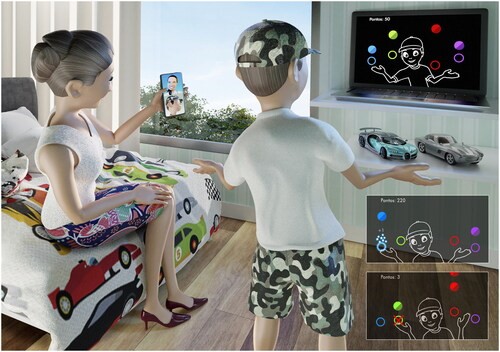
ARNI Stroke Rehab and Exeter University invite you to test examples of upper-limb VR kit on 15th December 2023 (10:00 – 17:00) in the world-class VSimulators building at Exeter Science Park, plus a follow-on exercise of lending you VR kit to for use at home for 6 weeks.
Would you personally like/are you able to apply get involved? Please apply now if appropriate, to come along and get involved in this super opportunity…
The day will be split into two Sections:
- Section A is Workshop entitled: ‘Stroke Rehab Principles: The Strategies & The Evidence’ led by Dr Tom Balchin, Director of The ARNI Institute, where you will learn about cutting edge rehabilitation techniques for people who have had stroke. You will also have the chance to ask Tom all the questions you’ve ever had about rehabilitation after stroke.
- Section B is a VR Research Section led by researchers from University of Exeter Medical School, including Professor Helen Dawes, Professor of Clinical Rehabilitation. You will have chance to try out our special virtual simulator laboratory and try different games for upper limb and balance rehabilitation. You will also be introduced to a new tele-rehabilitation device which you will be able to use in your own home as part of a 6-week study. Lunch will be provided in-between sessions.
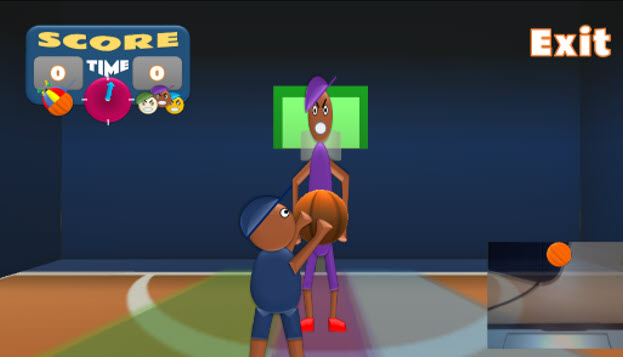
Research Session 1: you will take part in a study that give you the chance to try five game-based exercise platforms that can detect your movements using laptop and webcam. Each game consists of several activities designed to train your upper limb and trunk control from a sitting or standing position, according to your abilities.
In this session, you would do some exercises for your upper limbs from seated or standing positions to determine how well you can do the exercises and if these games will be helpful as home-based exercise for people who have had a stroke.
The research team will also ask you about your expectations (before the testing), your experience, and how you found the exercises (after each game).
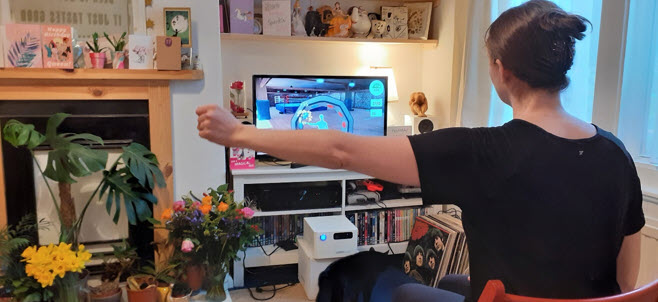
Research Session 2: you will be invited to try a home-based, immersive reality rehabilitation system, which is designed to detect ‘compensatory’ movement patterns and help you correct them.
Often after stroke people develop compensatory movement patterns in their upper limbs. This system uses an in-built camera to project the user onto their television screen so they can see themselves as an ‘avatar’ as they complete games and exercises. This system is able to track your movement patterns and alert you when you compensate during an activity.
After the Sessions: After the session, you may be able to continue with the study from you own home. Researchers from University of Exeter would help get the RehabKit set up in your home and provide you with personalised upper limb rehabilitation exercises for 6+ weeks.
To register: please get ticket at:
https://www.eventbrite.co.uk/e/758796359337?aff=oddtdtcreator
Or email: movewell@exeter.ac.uk and Exeter University will book you on your behalf.
Email tom@arni.uk.com for inclusion too, plus any questions.




One Comment
The article on using VR for upper limb improvement, it mentions that there are systems on the market but no recommendations – do you have any recommendations that I could buy for my husband as he has hardly had any physio on his right arm and therefore still has no real movement which is holding back his independence. Thank you